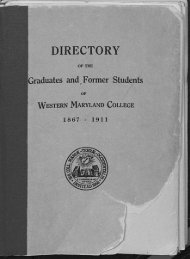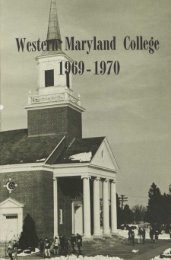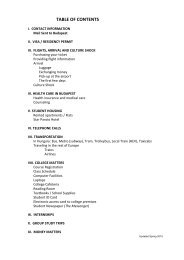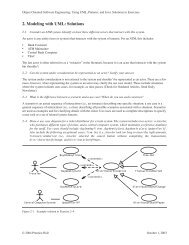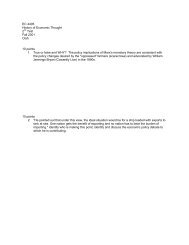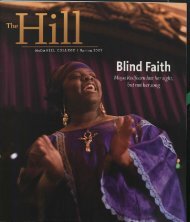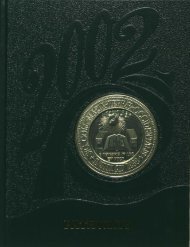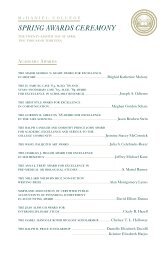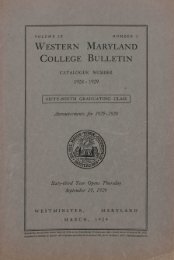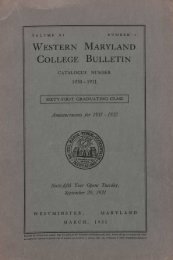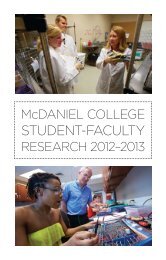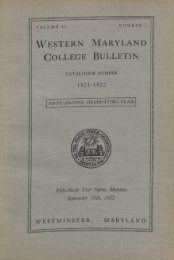Create successful ePaper yourself
Turn your PDF publications into a flip-book with our unique Google optimized e-Paper software.
The Student and Changeby James E. Robinson, Jr.Despite the barbs of such noted social critics as AlCapp and Ann Landers, 'college kids of today are notso much different than those who preceded them by10 or 20 years.There are differences, but the differences are moreeasily identified and obvious in the faculty and in societythan they are in students.Berkeley agitators and the so-called Vietniks are,really, not such vile creatures when one considers justa few historical precedents. Saint Augustine was literallydriven from the University of Carthage by irate students.'Ioday's student might merely publish an unfavorableefficiencyevaluation. Students of the twenties andthirties were no less concerned or demonstrative in theirsocial concerns than today's undergraduate. The IntercollegiateSocialist Society was the bane of many a collegeadministrator before World War I. In 1934, over500,000 students conducted a peace strike. By comparison,one must wonder why an occasional march onWashington or a Vietnam teach-in causes such nationalattention.A principal factor is the changed position of highereducation in American life. Colleges are no longer theplayground for the idle-rich, and a college degree is veryserious business for almost six million students. Society'sexpectations have changed drastically and as a consequence,methods and philosophies have been devised tomeet these more comprehensive demands.If higher education is predicated on preparation forthe vocations and professions, as it largely was beforeWorld War II, then one does "furnish the young, passivemind" with the great thoughts and deeds of hisancestors. The teacher is clearly "the" authority and thestudent 'a rather docile, submissive receptor.It is believed widely today that the essential functionof formal education is social, political, and economicreform. As opposed to training and indoctrination, reasonedskepticism and intelligent inquisitiveness are emphasized.It also follows, if one holds the contemporarynotion, that the teacher is not the all-knowing authorityof yesteryear. He is the experienced "guide" who is anequal partner with the student in the never-ending searchfor truth and the good life.This approach should not he confused with the taieeezfaireapproach of the public. schools sometime ago.Present day educators do insist that the student fullyunderstand what he accepts or rejects. One must servean apprenticeship of sorts or acquire license before oneis fully free to navigate his own course. Just as thereare "stages"of physical development, there are periods ofintellectual and social growth that need to be nourished.Although the college sophomore does not know "all"about the Civil War, should this make him blind topresent day injustices? Does his adolescence disqualifyhim from being free to voice his concerns? Should thecollege restrain him from the public protests that willcertainly elicit public condemnation of the college andvery likely result in reduction of financial support?Ten or fifteen years ago, the college's course waspatently clear: keep a tight rein on "them." Panty raidsand fraternity hazing caused hardly a ripple of publicconcern, but any student agitation judged to be not inthe community's interests was certain to arouse greatindignation and the wrath of the college. Present-dayeducators, and particularly teaching faculty, outwardlyencourage student participation in the great issues of ourtime. At many institutions the concern is not that studentsare "rocking the boat" but that they are apathetic.The fact that faculty espouse a revolutionary spirit forout-of-~lass~cti~itieswhile maintaining the staid, passive,and uDlmagmativelecture system in the classroom is notso much an illustration of hypocrisy as it is a failure todevelop teaching methods that support their new philosophy.In addition to greater faculty support and leadership,'Present students have the added luxury of being relativelyfree of material needs. The previous generationwas no less endowed with idealism,but for many collegewas as much a passport from want as from ignorance.~l:e~:~i~n~t~:~~e~~i!~v~~:~:::.eqUiredrisks or pay.The life of a student activist is still not an easy one.HIS most frequent and influential critics are his parents.Many parents refuse to or cannot understand that theneeds of a generation ago (better job, security, etc.) donot have the same great influence on their sons anddaughters. In greater numbers each year students are~n~erned with the kind of world they live in, and mostslg~l~ca~tly, what they can do now to change it. TheaCtiVl~tIS not so critical of the job his elders have doneas he IS with our rather smug satisfactionwith our efforts.He.sees the sham and hypocrisy of some aspects of ourSOCIety'and is first disillusioned and then rebellious.Rather than curb such great potential for good works,colleges generally see their role as one of sympatheticsupport and guidance. The one great fear is as Sir WaIterpagesecen



